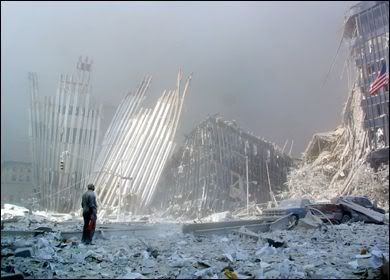 It was a beautiful September morning. For the last time, the sun rose between the Twin Towers.
It was a beautiful September morning. For the last time, the sun rose between the Twin Towers.At 8:55 am, I came out of the subway and the first thing I saw was an enormous band of black smoke in the sky. I rushed to my office building, two blocks down from the subway station, and asked the doorman if he knew what had happened.
“An airplane flew into one of the twin towers” he said in a somber voice.
“Oh my God! Was it a commercial plane?” I asked, suddenly aware of what this would mean for hundreds of people.
“We don’t know, nobody knows….”
I took the elevator to my office and as soon as I was there, the phone rang. It was a colleague from Milan.
“I am watching TV and I see the tower in flame! Do you know what happened? He asked.
“No, I am just arriving….”
“Santo Dio! He exclaimed, another plane just hit the second tower!!!
I dropped the phone and rushed to the TV room where all my colleagues had gathered. They were all was crying, screaming, calling names of the people they knew who worked at the World Trade Center. We could not believe our eyes.
“This is a terrorist attack! It’s no accident!
We stayed in front of the TV, mesmerized, until the first tower fell, and then the second. It was like a nightmare! Maybe it will go away; maybe it’s a bad joke!
The towers were located a few blocks south and west of the office, and very soon we were asked to evacuate the premises for security reasons.
I tried to call Joe to let him know that I was okay, but all the phones were out. We all took the stairs to get out of the building. In the street, people were crying or just in shock, a blank look on their face. The streets had been closed to regular traffic, except for police vehicles, firefighting trucks and ambulances. Buses had been chartered to go downtown.
With no public transportation available, hundreds of people started to walk up towards the north of the city. The smell of burning buildings was everywhere. Pedestrians were led by a police officer from one sidewalk to another. We were too devastated to have any reaction, and we followed the orders in silence. Some businessmen who had escaped the disaster zone were covered with gray powder. Women took their high heels off and walked bare feet.
New Yorkers are usually very talkative and lively, but today no one says a word. There are no smiles on their faces, just question marks and despair.
Who did that to us? Why? Our city is wounded and we all feel the pain. These people who died and are still dying are our brothers and sisters; it could be us out there! New York is our home and we are a family.
We walked a long time. I finally made it home and watched TV for three days, not even going out to buy food. I could not stop crying, even though nobody I personally knew was buried under the fallen buildings. Even now, while I write these memories, I am crying. Close to 3000 people died that day. Why? Can anybody tell me why?




